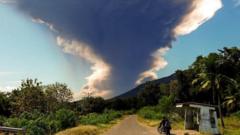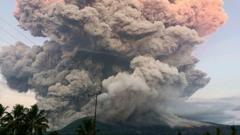On Monday, Mount Lewotobi Laki-laki in Indonesia erupted dramatically, releasing an ash cloud that soared approximately 11 miles into the atmosphere, significantly higher than its previous eruptions in recent months. Following a six-minute eruption, the volcano continued to display signs of activity throughout the day, with several additional eruptions reported. The recent ash cloud exhibited a towering height that is nearly four times greater than the three-mile-high plume produced during last month's eruption, which tragically resulted in the deaths of at least ten individuals. Fortunately, as of now, the Indonesian authorities have reported no casualties linked to this latest volcanic event. The national volcanic agency has since placed Mount Lewotobi Laki-laki at the highest alert level on its four-tier scale, reflecting the heightened risk.
Indonesia's Mount Lewotobi Erupts Again, Ash Cloud Reaches 11 Miles High

Indonesia's Mount Lewotobi Erupts Again, Ash Cloud Reaches 11 Miles High
Massive ash plume rises from Mount Lewotobi Laki-laki in Flores, Indonesia, marking a significant escalation in volcanic activity.
While Flores, where the volcano is located, is hundreds of miles away from tourist-heavy Bali and densely populated Java, the sheer scale of the ash cloud serves as a reminder of nature's unpredictability. When compared to historical volcanic events, this eruption's ash cloud remains less intense than that generated by the 2022 eruption in Tonga, which reached an astonishing altitude of 35 miles. The situation continues to be monitored closely as authorities advise caution for residents in the surrounding areas.
Mike Ives, a correspondent for The Times, reports from Seoul on global breaking news events.
Mike Ives, a correspondent for The Times, reports from Seoul on global breaking news events.





















